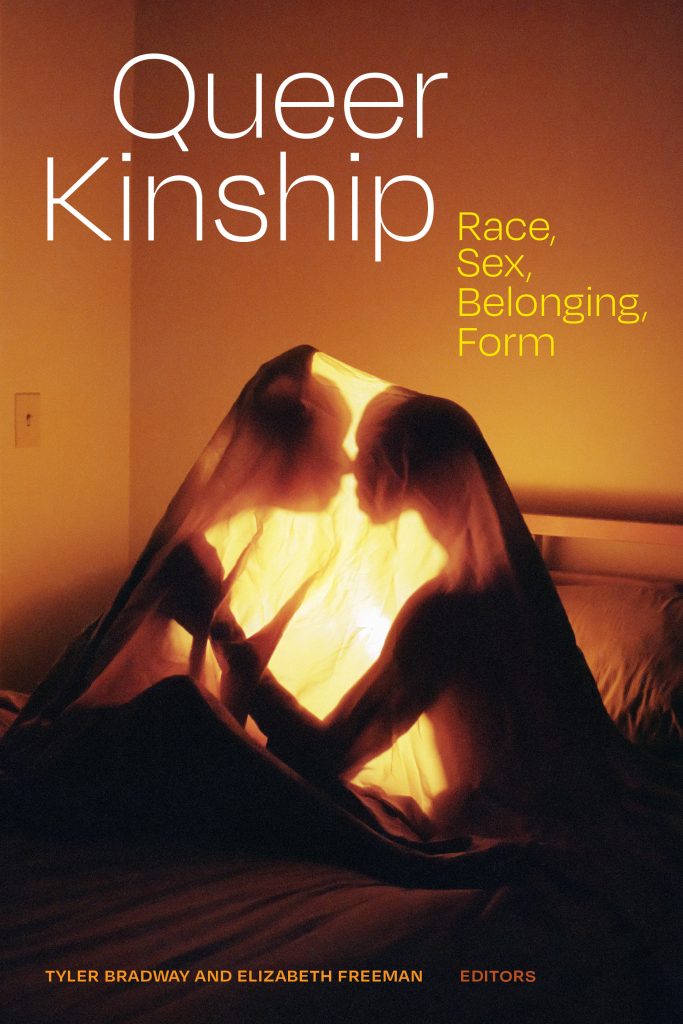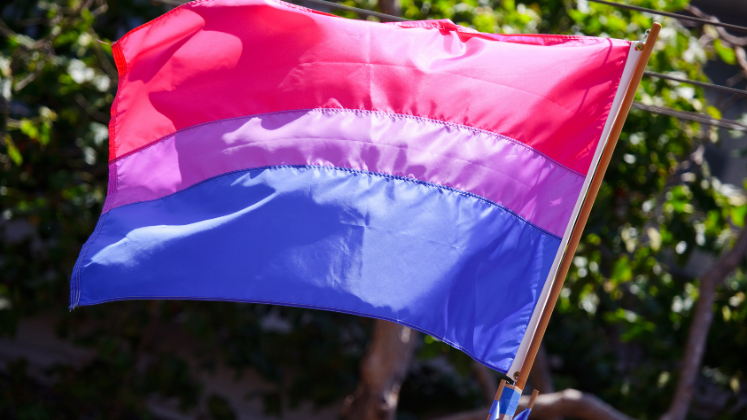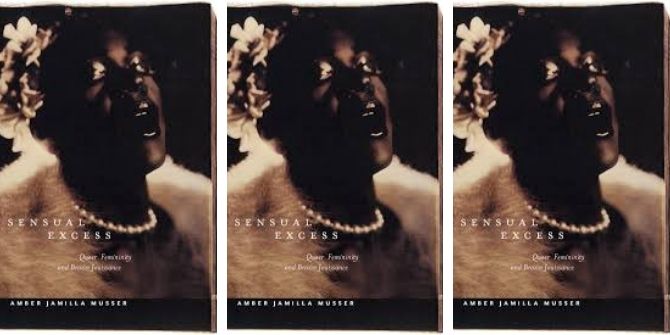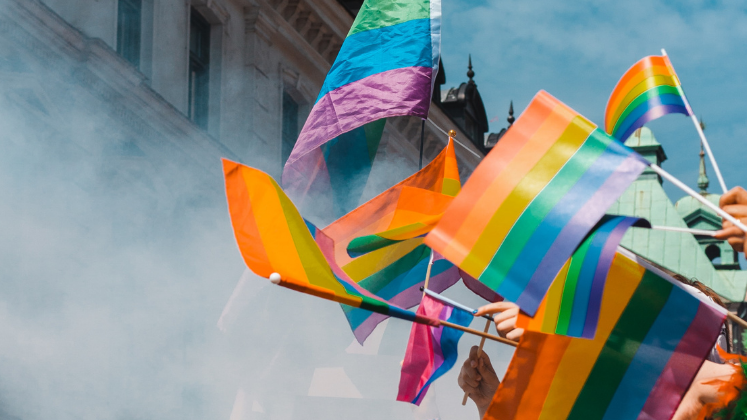In Queer Kinship: Race, Sex, Belonging, Form, Tyler Bradway and Elizabeth Freeman draw together a collection of essays examining how different conceptions of kinship inform queer theory and experience, as well as kinship studies. Pushing against hegemonic ideas of kinship, this book is an exciting, disruptive exploration of queer connection and belonging, writes Ry Montgomery.
Queer Kinship: Race, Sex, Belonging, Form. Tyler Bradway and Elizabeth Freeman (eds.). Duke University Press. 2022.
Find this book (affiliate link):![]()
 As the present trans panic metastasises, all too predictably, to reach all those within the LGBTQ+ community, the need for stronger and more steadfast bonds of solidarity grows ever greater. In Queer Kinship (Duke 2022), the reader finds a wealth of moving, inspirational reflections, revealing strategies of reparation and resistance through which to pursue our collective liberation.
As the present trans panic metastasises, all too predictably, to reach all those within the LGBTQ+ community, the need for stronger and more steadfast bonds of solidarity grows ever greater. In Queer Kinship (Duke 2022), the reader finds a wealth of moving, inspirational reflections, revealing strategies of reparation and resistance through which to pursue our collective liberation.
In the spirit of its parent series, the collection takes a disruptive and inventive approach to questions of kinship, (post)coloniality and queerness. Editors Tyler Bradway and Elizabeth Freeman underline the urgency of this project, at a time when ‘assumptions about heteronormative kinship’ appear increasingly untenable. Compiled at the fraught juncture of Trumpism and Covid-19, these essays confront the impossibility, and recklessness, of romanticising kinship. Rather, as Bradway and Freeman affirm, queer theory must acknowledge its longstanding ambivalence towards the notion of ‘kinship’, with all its essentialising connotations. The reader is under no illusion about the scale of this task, nor, given the many competing definitions of ‘queer’ and ‘kin’, its inevitable messiness. Bradway and Freeman propose three key concepts to navigate these questions: ‘kincoherence’, as the impossibility of fixing social relationships; ‘kin-aesthetics’, as the forms which kinship takes; finally, ‘kinematics’ refers to the fluid movements energising those relations. This framework recedes from view in the rest of the collection (reflective, no doubt, of the somewhat disparate nature of any edited volume); it remains, though, an exciting provocation, giving shape to the reader’s reflections as they think through and across the multiple readings of queerness, kinship and belonging which follow.
Queer Kinship comprises twelve essays, split across three sections—a structure which allows for the resonances between each contribution to come to the fore. Asking what a practice of ‘Queering Lineages’ might mean, the first tranche of essays engage with that most pervasive symbol of kinship in the Western imaginary: blood. Received ideas about kinship are revealed to be highly essentialising, centring genetics and sexual reproduction as the proof of relatedness par excellence. Judith Butler’s reflections on ‘Kinship beyond the Bloodline’ open this section; this proves a prudent choice on the part of the editors, as Butler traces a genealogy of thinking around kinship and blood relations highly instructive for readers less familiar with kinship theory. Writing in the context of the Trump administration’s family separation policies, Butler examines how the policing of kinship ties upholds a white supremacist vision of the nation state—one rooted in the foundational logic of slavery, that ‘ghost in the machine of kinship’, as Saidiya Hartman reminds us. How, in light of such fundamental violence, might we conceptualise ‘kinship’ as something generative?
Indeed, attending to the legacies of colonisation is a prerequisite for reimagining ‘kinship’ in the present. The triad of ‘Kinship, State and Empire’ frames the next cluster of essays, which expose the imperialist underpinnings of the Western family ideal. Central to this critical move are the contributions of Joseph M. Pierce and Mark Rifkin, both of whom foreground Indigenous forms of being in relation to the world. Pierce’s ‘kinstillatory praxis’—a refusal of the subject-object relations at the heart of settler colonialism—imagines a return to the ‘good relations’ of Cherokee kin-making practices. This restorative trajectory is a searing rebuttal of those ‘civilising’ reformers whose policies of allotment, adoption and abusive boarding schools produced a brutal regime of deracination. Pierce’s text, itself a ‘kinstillation’ of Indigenous thought and criticism, unsettles the liberal paradigm of filiation and private ownership imposed on stolen lands. In parallel, Rifkin employs the register of ‘governance’ to explore Native understandings of relationality and kinship menaced by the liberal model of ‘enfamilyment’. A common thread linking both essays is a focus on making kin as an embodied experience: for Rifkin, the body is ‘always enmeshed in ongoing matrices of relation’, extending beyond narrow definitions of the human; Pierce, meanwhile, affirms the power of ‘theorising from [his] own body and from the memories it bears’, balancing the embodied impact of trauma with the restorative promise of ‘good relations’.
The third set of essays examines ‘Kinship in the Negative’, analysing those instances in which kinship is refused or denied. Christopher Chamberlin introduces the notion of ‘Akinship’ to capture what he terms ‘the social impossibility of Black kinship’. His argument—elegantly weaved in electrifying prose—considers the racial logics of slavery, and their perpetuation in modern-day policing, as the ‘structural cause’ of kinship, defined in opposition to Black sociability. Chamberlin considers the mistreatment of Tyrone Garner in Lawrence vs. Texas, a case which helped pave the way for same-sex marriage across the United States. Targeted by the police, and failed by a (still woefully racist) gay movement, Garner’s story demonstrates how a neoliberal framework of kinship, increasingly amenable to monogamous, white homosexual relations, is ‘always the absolute repudiation of Black kinship’.
Elsewhere, however, negation appears potentially generative. Provocatively turning ‘Against Friendship’, Leah Claire Allen and John S. Garrison push the contentious anti-social turn in queer theory beyond sexuality and into the realm of ‘amity’. Close readings of Ocean Vuong and Valerie Solanas animate a critique of ‘chosen families’ as vectors of the neoliberal logic of ‘choice’. Whilst Allen and Garrison do acknowledge the utility of ‘chosen family’—both for its liberatory promise and its necessity as a means of survival—one wonders whether their ‘radical aloneness’ is less a revolutionary strategy than a theoretical luxury. Furthermore, in valorising casual, anonymous encounters which break with normative ideas of ‘friendship’, Allen and Garrison say frustratingly little about the ways in which digital spaces might allow such fragmentary forms of sociability to emerge. Indeed, across the collection as a whole, the digital is conspicuous by its absence—and, when explored in any detail, as in Juliana Demartini Brito’s moving reflections on the murder of Marielle Franco, remains somewhat under-theorised.
Nevertheless, Queer Kinship constitutes a remarkable achievement. Highly readable, theoretically rigorous and exemplary in its commitment to decentring colonial epistemologies, this collection stands to make a seminal contribution to queer and kinship studies. Yet these essays do more than encourage us to rethink kinship. Rather, the protean connections between each text are themselves an act of making kin—of forging ties between multiple and shifting contexts and perspectives. This radical openness continues into the final chapter, an interview with anthropologist Kath Weston, whose now-canonical Families We Choose is a touchstone for so many of the authors in this volume. Weston reflects on the questions of form, methodology and practice evident throughout the collection. Brief as it is, this makes for a fitting epilogue, inviting further reflection on the futures yet to be forged through the meeting of kinship and queer theory.
Queer Kinship elicits that most elusive of sensations in the reader: excitement. This is not to say, though, that kinship is imagined through rose-coloured glasses. The rage which courses through so many of these texts, in their damning critiques of a violently racist and queerphobic neoliberal order, is palpable. This rage, above all, is a call to remake kin beyond the realm of the theoretical. As we traverse the present moment of crisis, these essays inspire new approaches to community building and worldmaking which might yet bring us closer to experiencing queer kinship(s).
Note: This review gives the views of the author, and not the position of the LSE Review of Books blog, or of the London School of Economics and Political Science. The LSE RB blog may receive a small commission if you choose to make a purchase through the above Amazon affiliate link. This is entirely independent of the coverage of the book on LSE Review of Books.
Main image credit: Raphael Perez via naive art on Flickr.







